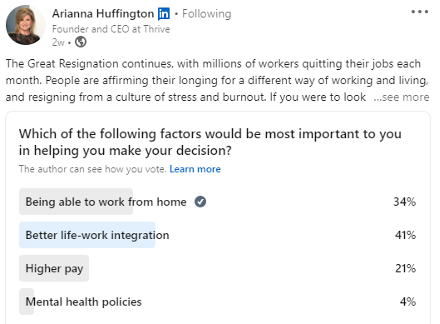In the first part of this two-part article on the hybrid work model, we discussed remote work from a productivity perspective. For the most part, the numerous studies that are coming out are stating that productivity is either unaffected or increased, and this is especially true for knowledge workers.
In addition, most employees prefer working from home, or at least having this option part of the time. We will now take a closer look from an HR perspective as to why maintaining or implementing a permanent hybrid work model may be the smartest choice for your organization. We will seek to answer:
- Do my employees want to work from home? Why?
- What are the benefits of a hybrid work model?
- Does offering remote work help with recruiting great employees?
- Do I risk losing good employees if I don’t implement remote work?
- What is a reasonable balance for remote vs. workplace?
- How do I implement a work-from-home policy?
- How do I optimize a hybrid work model?
What do employees want? Do they prefer a Hybrid Work Model?
Yes, the stats are clear. The majority of employees want the option to work remotely, at least part of the time, and they feel very strongly about this! Some survey results show:
- 76% said support for flexible work post-pandemic is important to them
- 62% want to work from home at least 40% of the time
- 30% want to work remote at least 3 days per week.
- 27% of Canadian office workers would prefer to be fully remote
In fact, just 12% said that working entirely from the physical workplace would be most ideal. While many employees missed the social connections and other benefits of being in the workplace, the benefits of hybrid work far outweigh the in-office advantages.
As quoted in the HR Reporter:
It’s clear that the role that the physical office plays in the day-to-day work and satisfaction of employees has changed dramatically during the pandemic. We’re not going back to how things were before, and businesses need to adjust to the many operational realities that come with that,” says Nick Georgijev, country manager for Amazon Business Canada.
Why do employees prefer remote work? What does remote work offer?
Turns out that positive workplace culture is much more than ping pong tables and endless snacks, which don’t actually provide employees with key things they really want to feel valued, which include flexibility, work-life well-being and autonomy. Among other benefits, working from home at least part of the time offers:
- Reduced costs in commuting; transit and vehicle maintenance
- Time gains, including from lack of commute
- Location flexibility, such as the ability to live in a lower cost area
- Flexible working hours
- Customizable office spaces and the comforts of home
- Mental health benefits and general improved well-being
- Increased productivity for many
- Overall healthier people, according to studies on long-term hybrid workers
To expand on a few of these points, for many, the ability to work from home is a key part of improved work-life well-being. Flexibility as to where one works can be an integral piece in achieving a balance that minimizes work related stress while optimizing health and general well-being.
For example, for those with young kids, working from home instead of commuting to a physical workplace can mean many extra hours spent with young children, per day. It can mean easily integrating simple household tasks, rather than being absent from the home for eight or ten hours or more.
Many of the benefits are both financial and reduce stress: reduced or no commute, less time and money spent on office apparel and physical appearance, and the potentially most significant, housing. When it comes to housing, being able to work remotely could mean the ability to live in a lower cost region, rather than near the major city centre where the office is located. In fact, 48% of those who moved since the pandemic began, factored remote work into their decision.

How can the Hybrid Work Model be an advantage for Employers?
Many of the advantages that may be seen as beneficial to employees are equally beneficial to employers. Implementing the ability to work remotely, offers employers:
- Broader talent pool, as you can hire from anywhere
- More loyal, long-term employees
- Reduced cost for office perks and office space
- Potentially increased productivity
- Increased employee morale and engagement
Notably, when employers can recruit from a wider, more diverse group of people due to location flexibility, there is the potential to attract more and better candidates, including those who desire a hybrid work model due to their unique circumstances. And of course, it works both ways: Just as a broader talent pool benefits you as an employer, employees have opportunities that are not limited or defined by geography.
Remote work also appears to increase employee retention: “72% of employers say remote work has a high impact on employee retention—employees are sticking with their employer when they have remote work options.”
How are employers viewing the movement towards hybrid or even fully remote work?
According to a BDC study, 74% of SME owners say they will offer their employees the opportunity to continue to work remotely. This varies between organizations and person to person, but generally, employers appear to be understanding the dual benefits to offering a hybrid work model.
Will offering a Hybrid Work arrangement help me in recruiting great employees?
Yes. Job seekers are asking for work location flexibility at an increasing rate and many are completely unwilling to take jobs where at least some remote work is not a possibility. Today, to be competitive, offering hybrid work is becoming more and more essential.
According to the BDC, 54% of employee say “access to remote work will be a determining factor” in both applying for or taking a job. When Arianna Huffington posted a poll to Linked In February 2022, asking ‘if you were to look for a new job, what’s most essential to you’? the results confirmed people have balance in mind. “Being able to work from home” got 34% of the vote, with 40% going to “Better life-work integration,” These two go hand-in-hand, one could argue.

Will my employees leave if I don’t allow for a Hybrid Work Model?
For many, it’s a dealmaker/ dealbreaker. When surveyed, employees indicate they would consider leaving their job if they were forced to return full time to the office.
- 43% are likely to look for a new job if their employer mandates a return to the office full time.
- Almost 50% of Gen Z and Millennials would consider quitting if their employer didn’t offer remote work.
While it may seem extreme, the reality is that employees have many options now. With so many having been given the opportunity to experience working from home due to the pandemic, they are not willing to turn back.
“Companies that refuse to support a remote workforce risk losing their best people and turning away tomorrow’s top talent.”- Stephane Kasriel, CEO of Upwork
With more and more progressive employers embracing the mindset that ‘it doesn’t matter where or how you work, just that the job gets done,’ why wouldn’t employees seek out these roles, given the majority of our workforce is telling us they want this?

How do Employers implement a formalized Hybrid Work model?
If you’re like many employers, prior to the pandemic, you may have had few or no employees working remotely, so never required a remote work policy.
The challenge? Determining how to integrate this work model in a more formalized way. If you’re like the majority of employers, you may lack a strategy. As with any employee benefit, your approach needs to consider the values of your organization, the purpose of the benefit, in addition to the actual details of the new structure. Consider:
- Roles; which roles can be done fully remotely, versus those that require a worksite presence?
- Put it in writing; details your expectations and employee responsibilities and revise employment contracts where applicable.
- Structure; How many days in vs out? Is it a set policy? Is it different for different people/ different roles?
- Personal circumstances; what works for one employee may be different from another and considering personal circumstances show employees you value them as individuals.
- Support and Supplies; What will you provide employees to support their work from home? Tech equipment, supplies? Ensuring smooth tech is key to success.
- Virtual check-in’s. How many are needed, and what are the requirements? Camera on or off?
- Rethink your Key Performance Indicators; what was measured in the past may shift in a hybrid work model.
- Management; ensure equal time for those in-office and those working remotely, and ensure communications and decisions do not favour one employee type over the other
- In-person events and meetings; occasions to bring people together in person are valuable and a great opportunity to team build and improve morale.
There are many factors to consider, and like all employer decisions, taking the time to think through all the pieces is important. The impact of decisions surrounding WFH can be significant and deserve proper attention.
Is providing the option to work from home an ‘employee benefit’?
I would argue that this falls solidly under ‘total compensation.’ The flexibility to work from home is invaluable to so many people, and could be the difference in securing amazing team members. There is value in offering workplace flexibility, and it’s no surprise this is showing up as a key feature in many job postings.

Empower your employees: the smart choice to optimize productivity
At the end of the day, if you’re hiring good people that you trust, and the job is getting done, why not empower employees to make the choice as to the best place for them to be most productive? Trust goes a long way, in fact, according to the Harvard Business Review, employees in “high-trust companies” report
- 74% less stress
- 106% more energy
- 50% higher productivity
- 13% fewer sick days
- 76% more engagement
- 29% more satisfaction with their lives
- 40% less burnout.
Adopting a hybrid work model shows you trust employees to get their work done effectively and on time, even when you can’t physically look over their shoulder. While it means making changes to how you manage and measure work, ultimately, it’s a work model that is here to stay and offers numerous benefits for everyone. However, like any employer decision, it’s best to formalize your expectations when it comes to working under a hybrid model.
Looking for assistance in developing your own employee benefits program and policies? We love to hear from you!
Sources:
Courtney, Emily. The Benefits of Working From Home: Why the Pandemic isn’t the only Reason to Work Remotely. (Flex jobs). https://www.flexjobs.com/blog/post/benefits-of-remote-work/
BDC.(June 15, 2021). Remote work is here to stay: BDC study. BDC. https://www.bdc.ca/en/about/mediaroom/news-releases/remote-work-here-stay-bdc-study
Birkinshaw, Julian, Cohen, Jordan, Stach, Pawel. (August 31 2020). Research: Knowledge Workers Are More Productive from Home. Harvard Business Review. https://hbr.org/2020/08/research-knowledge-workers-are-more-productive-from-home
Munro, Matt. (May 31, 2021). How Working from Home Increases Productivity. WBM Technologies.https://www.wbm.ca/blog/article/how-working-from-home-increases-productivity-infographic/
Kelly, Jack. (March 16th, 2022). Hybrid Will Be The New Work Style, But 72% Of Businesses Lack A Strategy, AT&T’s ‘Future Of Work’ Study Shows. Forbes.com. https://www.forbes.com/sites/jackkelly/2022/03/16/hybrid-will-be-the-new-work-style-but-72-of-businesses-lack-a-strategy-atts-future-of-work-study-shows/?sh=1c351e083989
Staff. (April 7, 2021). 90% of Canadian remote workers say working from home hasn’t hurt productivity: survey. Benefits Canada. https://www.benefitscanada.com/news/bencan/90-of-canadian-remote-workers-say-working-from-at-home-hasnt-hurt-productivity-survey/
Staff. (2022). Key Benefits of the Hybrid Work Model for Employers and Small Businesses. Rocketlawyer.https://www.rocketlawyer.com/business-and-contracts/employers-and-hr/company-policies/legal-guide/key-benefits-of-the-hybrid-work-model-for-employers-and-small-businesses
Staff. (October 4th, 2021). Majority of Canadians want to continue working remotely post-pandemic: survey. Benefits Canada. https://www.benefitscanada.com/news/bencan/majority-of-canadian-workers-want-to-continue-working-remotely-post-pandemic-survey/

Lindsay Byrka, CFP® BA, BEd
Vice President, Immix Group: An Employee Benefits Company
A Suite 450 – 888 Dunsmuir St. Vancouver V6C 3K4
O 604-688-5262



